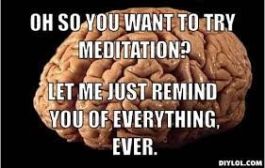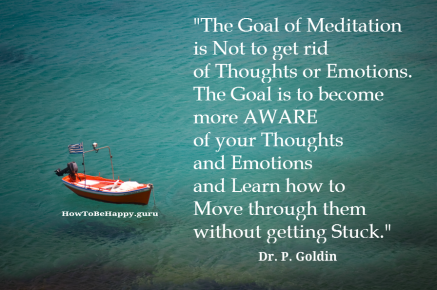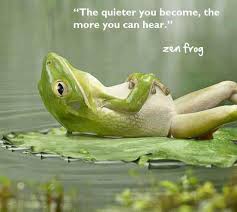Perhaps one of the biggest benefits of meditation is how much spaciousness it creates in that crazy racing mind of ours. Meditation is like a major decluttering experience for our busy brains.
 I remember so very well the first time I attempted to meditate. Let’s just say it didn’t go so well — not only did my racing thoughts multiply, I heard every little sound in the entire house. At the time, I was ready to throw in the towel and say “this is definitely not for me”.
I remember so very well the first time I attempted to meditate. Let’s just say it didn’t go so well — not only did my racing thoughts multiply, I heard every little sound in the entire house. At the time, I was ready to throw in the towel and say “this is definitely not for me”.
Then I recalled that I also felt this same way about golf when I first began to learn that complex game. I was overwhelmed with swing mechanics, club selection, rules and etiquette. Yet over time, I became passionate about golf. In fact, it has enriched my life in so many ways not the least of which is all the incredible friends I have made.
Is it any wonder that meditation was equally challenging for me that very first time I sat cross-legged on the floor? My mind was like a freeway of thousands of unrelated racing thoughts and no exits. I didn’t have the knowledge or skills to quiet my mind.
So I decided I’d have to use a similar approach to meditation that I did for golf — and not give up so readily. I lowered my expectations to a more realistic level acknowledging that I was not going to be instantly successful. I adopted a more open-minded (no pun intended) approach to my “practice”. Just as in golf, it is the tiny incremental improvements made over time that manifest themselves into big progress down the road.
Initially I found that guided meditation was an easier way to get started. A skilled meditation leader is like a golf instructor — offering you a few helpful instructions at the onset and then providing quiet space to try it on your own. Throughout a guided meditation practice, your “coach” will quietly remind you to bring your wandering mind back to your practice. Once you become aware of how often random, unrelated thoughts pop into your head, you begin to wonder how you effectively function at any task!
It was incredibly beneficial to have this guided framework for meditation. I learned a lot from meditation coaches about setting an intention for the practice, how to focus on the breath to keep the mind quiet, and how to train the mind to set aside distractions.
The “aha” moment for me was discovering that meditation is training the brain to be selective about thoughts and to discard thoughts that are interfering with the present moment experience. Consistent meditation practice helps you get more effective at doing this naturally in your active daily life.

The beauty of meditation is that over time, you free up a lot of space in your cluttered mind and that spaciousness is really transformational. You develop a newfound sense of awareness not only during meditation but also in your day to day life and in your relationships.

I first realized that my meditation was having a big impact when I woke up one night with thoughts running through my head and my new natural reaction was to take a few calming breaths and start letting those thoughts drift away. I was surprised at how quickly I fell back to sleep.
The most notable impact however is how my practice is now showing up during my waking hours. This “training of the brain” allows me to have a lot more clarity when I am making decisions, doing tasks and interacting with others. An added bonus is that I am enjoying all of these things more than ever because I am less distracted.

When I first started my daily meditation practice, I confess that it felt like a homework assignment — an obligation. Over time, I found that I was beginning to look forward to that quiet chunk of time. I now consider it an exercise program for my mind. Just like physical exercise makes me feel stronger and even more energized, meditation makes me feel grounded and more aware. I would have never guessed that one day I would look forward to my meditation practice with the same happy anticipation that I have for that steaming first cup of morning coffee.

In today’s busy world where we are bombarded with a steady stream of external distractions (especially from our technology), meditation can play a meaningful role for our quality of life. Decluttering our minds creates space for soaking up the moments in our daily lives that we treasure the most.

Valuable Resources for Learning More about Meditation:
Headspace App – guided mediation practices and animated informational videos
Mindful Magazine and Mindful.com – informational articles and links to resources
SoundsTrue.com – videos and guided meditation practices, articles
Meditation is Not What You Think – book authored by Jon Kabat-Zinn
Also, check into local meditation classes which are now being offered at health club, fitness centers and yoga studios.

This lovely article is just what I needed…beautifully written, beautifully calming! Thank you for sharing your many gifts, Amy!❤️
LikeLike